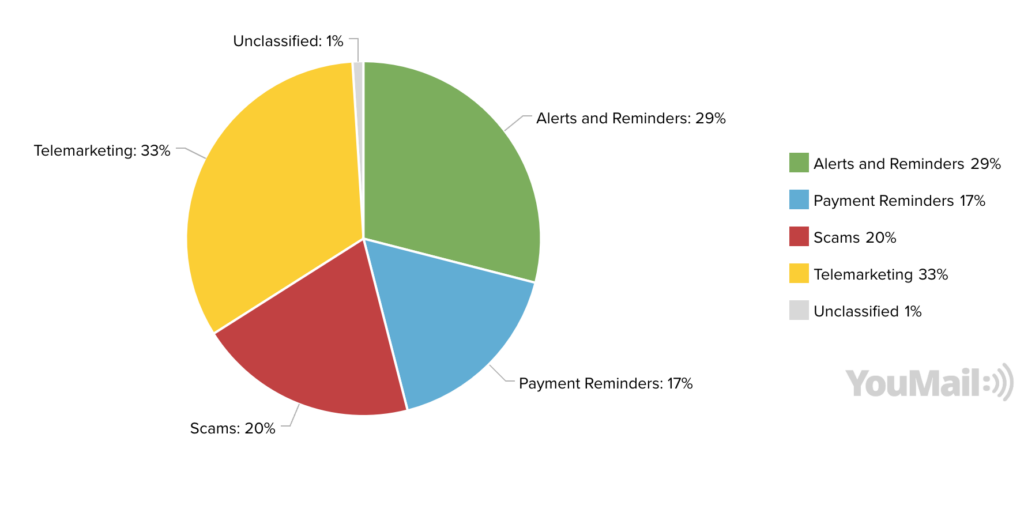The world of spam calls and spam texts is evolving rapidly, with scammers and telemarketers constantly changing tactics to bypass call-blocking systems. In September 2024, Americans received a staggering 4.5 billion robocalls, and the surge in robotexts is equally alarming. The shift in tactics—from traditional scam calls to scam texts—marks a new frontier in the ongoing battle to protect personal information. This article dives into the latest robocall data and explores how spam calls and scam texts are changing, and what consumers can do to fight back.
In this article we will cover:
- The Rise of Scam Texts: A New Digital Threat
- Robocalls vs. Robo Texts: A Shift in Scam Strategy
- Why Are Robo Texts Gaining Popularity?
- Telemarketing Still Leads the Robocall Charge
- Scam Texts and Political Messages: The Election Season Spike
- Protecting Yourself from Scam Calls and Texts
The Rise of Scam Texts: A New Digital Threat
While robocalls have long been a problem, scam texts (or robotexts) are becoming increasingly prevalent. These unsolicited messages often pretend to come from trusted sources, including banks, delivery services, or government agencies, urging recipients to click on malicious links.
Unlike scam calls, which can often be avoided by simply not answering unknown numbers, spam texts are harder to filter. The rise in scam texts is partly due to the increasing difficulty for scammers to bypass call-blocking apps and regulations designed to curb telemarketing and spam calls. Sending fraudulent text messages has become an easier way to reach unsuspecting victims,
Robocalls vs. Robo Texts: A Shift in Scam Strategy
The data from September 2024 indicates that robocalls are still a major problem, but scam texts are quickly catching up. While telemarketing campaigns and scam calls remain a primary concern, the rise in scam texts represents a new wave of digital harassment. Many consumers have become savvy to the signs of a scam call, but scam texts are often more difficult to spot, making them a particularly dangerous threat.
Here’s how spam calls and spam texts are evolving:

- Telemarketing Calls: 33% of all robocalls in September
- Scam Calls: 20%
- Alerts and Reminders: 29%
- Payment Reminders: 17%
- Scam Texts: On the rise, now frequently seen during election seasons and peak shopping periods.
The shift toward scam texts means consumers need to be more vigilant about not only the calls they receive but also the text messages that flood their phones.
Why Are Robo Texts Gaining Popularity?
One reason robotexts are becoming more common is that they often circumvent the protections built into call-blocking apps. Many consumers rely on apps like YouMail to filter spam calls, but text messages are harder to block. Scammers know this and have adapted their strategies to include more text-based scams.
Another factor contributing to the rise of scam texts is the increasing integration of smartphones into everyday life. People rely on their phones for everything from banking to social media, making them more likely to engage with a text than answer a suspicious phone call. Scammers take advantage of this by crafting messages that appear urgent, such as “Your bank account has been compromised. Click here to secure your account.”
Telemarketing Still Leads the Robocall Charge
Despite the rise of scam texts, telemarketing remains the largest category of robocalls, accounting for 33% of all calls placed in September 2024. While some telemarketing calls are legal, many campaigns operate in a gray area, stretching the limits of regulations designed to protect consumers from spam calls.
The Telephone Consumer Protection Act (TCPA) is supposed to curb unsolicited telemarketing calls, but companies often exploit loopholes, leading to an increase in complaints. Even with stricter regulations, the sheer volume of telemarketing robocalls remains a significant issue for consumers.
Scam Texts and Political Messages: The Election Season Spike
As elections approach, political campaigns are using robotexts to reach voters at an unprecedented scale. While some of these messages are legitimate, others exploit the confusion of election season to spread misinformation or trick recipients into clicking on harmful links. During these times, scam texts often mimic official political organizations, creating a sense of urgency around voter registration or donations.
This trend reflects a broader shift in scam strategies, where fraudsters use current events, such as elections or economic crises, to craft convincing narratives that lure victims into providing personal information or clicking dangerous links.
Protecting Yourself from Scam Calls and Texts
With both scam calls and scam texts on the rise, it’s crucial for consumers to take proactive steps to protect their personal information. Here are a few ways to safeguard yourself:
- Use call-blocking apps: Apps like YouMail can block known spam calls and filter out suspected scam calls.
- Be wary of unknown numbers: If you don’t recognize the number, let it go to voicemail. Scammers rarely leave messages, and legitimate callers will.
- Don’t click on suspicious text links: If you receive a text from an unknown number, especially one that asks you to click a link, delete it immediately.
- Report scam texts: Many phone carriers offer the option to report scam texts by forwarding them to a specific number, helping others avoid similar attacks.
Download YouMail and instantly stop spam calls, texts, and voicemail.
The Future of Robocalls and Scam Texts
As scam calls become harder to pull off due to increased regulations and more effective call-blocking technologies, it’s likely that we’ll continue to see a rise in robotexts. These text-based scams are harder to block and easier to disguise, making them an attractive option for fraudsters. Additionally, the upcoming election season and other major events will likely lead to a spike in both scam calls and scam texts, as scammers use these opportunities to target unsuspecting consumers.
Conclusion: Stay Vigilant and Protect Yourself
The evolution of spam calls, scam texts, and robotexts means consumers need to stay vigilant. Whether it’s through the use of call-blocking apps, being cautious about text messages, or simply not answering unknown numbers, taking proactive steps can make a big difference in protecting your personal information. Download the YouMail app today to block unwanted calls and reduce the risk of falling victim to scams.





